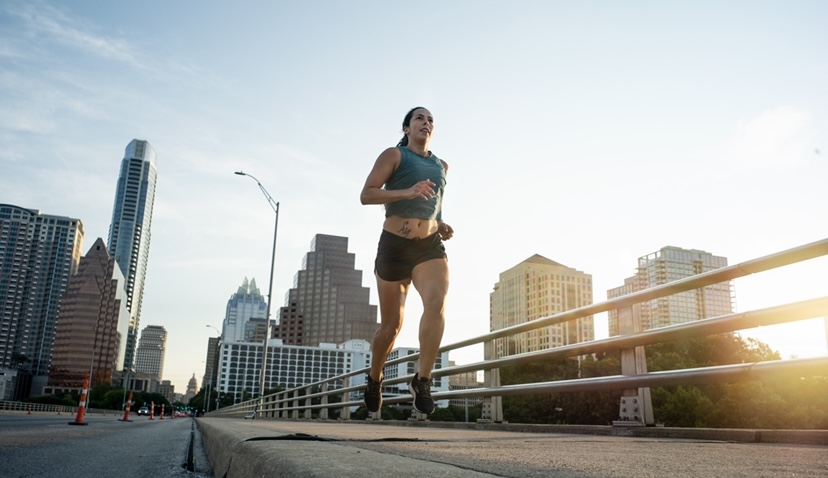Looking Ahead to Spring 2021: A Q&A with Austin American-Statesman Event Manager Chris Thibert

There is no question that last spring’s cancellation of the Statesman Capitol 10,000 was the right call. As Austin’s largest 10K, race organizers take the safety of the runners and the community as the top priority. In New England, the Boston Marathon was postponed from its April 20 date to September 14, and then a month later, canceled for the first time in its 124-year history as it became apparent that the COVID-19 pandemic was not abating. It wasn’t long before big fall races like the New York City Marathon and Chicago Marathon announced their cancelations.
The Capitol 10,000 is currently on track for its 2021 date of April 11. Unlike the big fall races, there’s a good chance that the infection rate and other metrics of the COVID-19 pandemic will be diminished enough to stage the event. To find out more, writer Brom Hogan spoke to Chris Thibert, event manager at Austin American-Statesman.
BH: As an event planner with the race next spring what’s going through your head right now?
CT: My 10-year-old and 15-year-old sons, 12-year-old nephew and wife will run the race next year. Right now, I’m thinking about what will make the race safe enough for my family to participate with the least amount of risk. Personally, what will our family do to prepare ourselves to attend.
BH: What are some of the steps you anticipate will be taken to ensure the safety of the runners?
CT: Our primary focus for the 2021 race is to produce a live race. Our main attention will be spent reviewing best practices from special events in our industry to prepare an action plan that addresses participant safety first and foremost. We anticipate a communication plan that addresses new health and safety protocols.
BH: What have you learned from other road racing events that are gradually returning?
CT: The wellness of a community goes hand-in-hand with road races. This was a sentiment shared by event promoters attending a recent online conference. Races are vital to the economics and physical health of a community. Almost all road races support and benefit local business and services in their respective communities. And an active community is generally more physically and mentally healthy. Collectively the message was to work with local authorities and return to live races responsibly ASAP.
Races will transition to controlled wave starts, rolling starts or reserved starts. Similar to a reservation at a restaurant some races will allow you to choose your start time when you register. Other events will give you a time period to start and allow you to stroll up and start during a window of prescribed time. Both methods are designed to reduce staging density before crossing the starting line. Additional measures include:
- Race attendance might be capped more frequently.
- Race caps will be lower. Some live races will defer to virtual until the climate changes.
- The financial feasibility of live race is limited when attendance is restricted. (Some races that have added a virtual race option have seen more national and global participation.)
- Greater municipal oversight, especially from health department sectors.
- More reliance on pre-packaged goods, creating more waste and recyclable byproducts.
BH: What entities are you currently working with as you start to plan your event?
CT: Austin Center for Events as well as Experience Sector COVID-19 Recovery Working Group.
BH: What’s the fallback plan (in terms of cancellations and or the ability to run next year’s event) in case the pandemic is not under control at that point?
CT: While we’ve had to cancel our race the past two years, the Statesman has allowed every participant to register for free in the next year’s race. We hope to continue this plan, in the event we are met with a cancellation decision. New this year for Cap10K, participants can purchase a Runner Protection Plan which guarantees a full refund according to the plan’s rules and regulations. Should the live event be canceled by State or local authorities, we would first pivot to a virtual race experience.
BH: What are some of the things that are helpful in terms of a large outdoor event versus say an indoor concert?
CT: The advantage of outdoor events in terms of transmission of airborne pathogens is greater space, air circulation, temperature, and movement. In any road race participants indefinitely spread out the longer the race distance. Additionally, participants at road races are moving and not standing in one place like at a concert. An indoor event’s space is regulated by the building’s occupancy limit. The occupancy limit can create conflicts against profitability and safety.
In terms of road races versus concerts, the nature of concerts is static viewing with a high density for an extended period. Road races typically see medium density only at the start and then rapid disbursement.
BH: When the race had to be called off last spring, did it ever occur to any of the Statesman’s staff that the 2021 event would be in question?
CT: Nope, it was never in question. We knew we would need time to regroup but that our path was to press forward. We started gathering intel on the COVID situation before our 2020 race was officially canceled by the state authorities and began formulating strategies for 2020 and 2021.
Article by Brom Hogan, freelance writer for the Austin-American Statesman.






